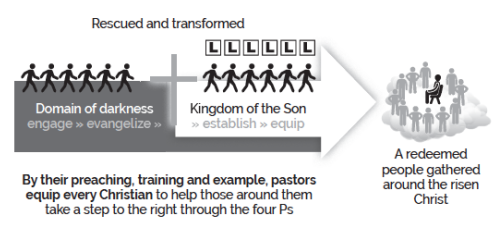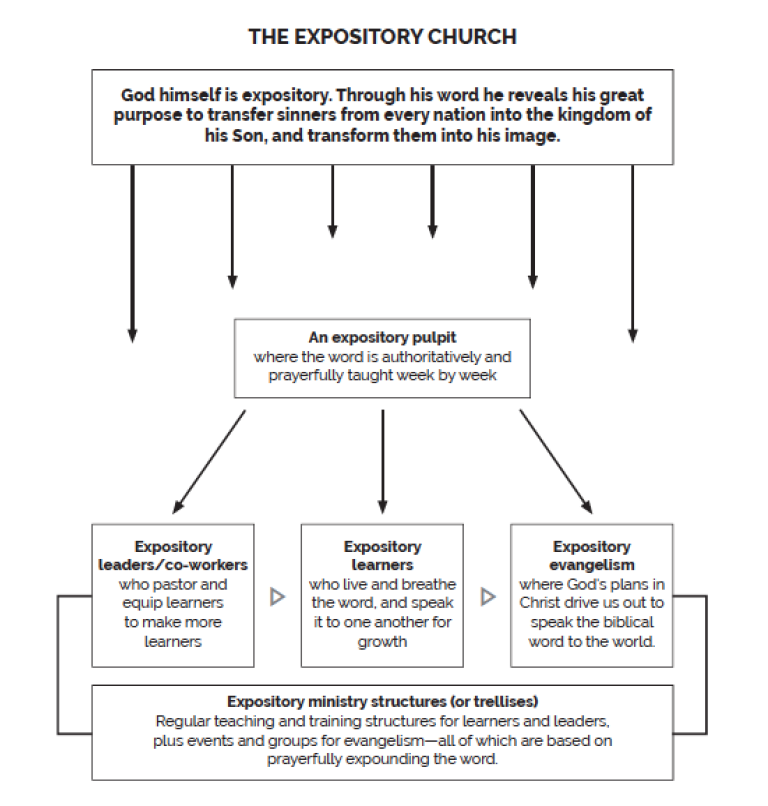Our friends Colin Marshall and Tony Payne, authors of The Trellis and the Vine, have recently released a “sequel” to the book that Mark Dever called “The best book I’ve read on the nature of church ministry.”
The Vine Project: Shaping Your Ministry Culture Around Disciple-Making seeks to sharpen and build upon the principles shared in The Trellis and the Vine to comprehensively and practically answer the question, “How can we shift the whole culture of our church in the direction of disciple-making?”
 The quotes below give a snapshot into the heart and content of The Vine Project. Learn more about The Vine Project in our review.
The quotes below give a snapshot into the heart and content of The Vine Project. Learn more about The Vine Project in our review.
This book does come with a minor language warning: several times American readers will be shocked by an extra “u” in a word like “behavior”, referring to “mom” as “mum”, or calling a shopping cart a “trolley.” We sincerely hope you can overlook the peccadillos of our friends ;).
Order The Vine Project on Amazon or through Matthias Media’s website.
[Read our summary conversation walking through The Vine Project’s 5 Phases.]
We long for Great-Commission style ‘vine work’ to be the normal agenda and priority within our churches. We yearn for every member of our congregation to grasp this and to live it—to pray for and reach out to those around them to make new disciples, and to nurture and edify and encourage one another to maturity in Christ. (15)
How can we shift the whole culture of our church in the direction of disciple-making? That’s the question that The Vine Project is aiming to answer. (16)
Disciple-making is really about calling people to faith and hope in Jesus Christ in the midst of this present evil age, with all its pressures. To become a church more focused on disciple-making is to become a fellowship that understands more clearly why life is often hard, and what resources God has given us to grow in faith and hope and love in the midst of the struggle. A disciple-making church is actually better able to handle the crises and pressures of everyday life. (17)
You can’t usually change culture by trying to change culture. You must change deeply held beliefs/convictions that underpin culture (even underlying ones) and activities, practices, structures that express those beliefs. (31)
This is why we want to make more and more disciples of Jesus Christ: because God’s goal for the whole world and the whole of human history is to glorify his beloved Son in the midst of the people he has rescued and transformed. (58)
Making disciples is not primarily a human activity with goals that we set (although it is those things in a subsidiary sense). Whatever happens in Christian ministry and in church, and whatever happens in our neighbour hoods and families and work places, is part of what God is doing to move all things inexorably towards their goal and end—which is Jesus Christ. (59)
The people Jesus calls to be ‘learners’ don’t have a blank slate. Their slate is very full—of foolish, darkened, enslaved thinking that is opposed to learning Jesus at every point. Becoming a learner of Christ therefore requires a radical change. It requires a great work of God to rescue us from the dark domain in which we were enslaved, and to transfer us into the kingdom of his beloved Son. From our side, it requires repentance—that is, a dying to the web of lies that our lives once were built on. (67)
Everything we do as God’s gathered people (as ‘church’) should be an exercise in the transformative learning of Christ. (71)
What is a disciple? A forgiven sinner who is learning Christ in repentance and faith. (74)
Disciples are made by the persevering proclamation of the word of God by the people of God in prayerful dependence on the Spirit of God. (83)
In the New Testament, the proclamation of the word is the basic means for creating and growing ‘Christ-learners’. You could even say that there is only one central activity in making disciples—the speaking of the word of God —and that all the other elements describe in what Spirit, by which people, and in what manner that speaking is done. (84)
One symptom of a congregational culture that is weak in ‘disciple-making’ is that there are few contexts or instances beyond the Sunday sermon in which the Bible’s word is regularly being spoken.(86)
Prayerlessness, like Wordlessness, is a classic symptom of a sick disciple-making culture. (90)
The goal of every form of Christian ministry could be summarized simply as seeking to help each person, wherever they happen to be…to come closer towards hearing the gospel and being transferred out of the domain of darkness into the kingdom; and then to press forward towards maturity in Christ in every aspect of their lives. (96-97)

With confidence that God will work through his word and Spirit, even slowly and gradually over time, we can all do our part in helping everyone around us take a step forward in Christ. (99)
In a church where the four Ps are being widely practised by many believers across the congregation, the sermon is an occasion not just where one man speaks, but where he teaches a multitude to speak. In his preaching, a pastor sounds the tuning fork so that the whole orchestra knows in what key to play. He teaches and guards the sound deposit of the gospel so that all may know it clearly and thoroughly (for how else will they speak it?). He shows them not only what the Bible says, but how they can read and speak that truth for themselves. He constantly teaches the sound doctrinal framework that shapes the Bible reading and speaking of the whole congregation. (117)

If we want a church culture of transformative learning, our households need to reflect this vision, and our families need to be taught and encouraged and equipped to embrace it. The connection between home-based and church-based disciple-making is very close. The one will nurture the other. (140)
“It is better to hear one sermon only and meditate on that, than to hear two sermons and meditate on neither.” Thomas White (164)
If we wish everyone in our congregation to be feeding on and digesting and praying over the word of God, then we cannot ignore the importance of doing so ourselves. (165)
Prayer comes before transformation, as we beg for God to change us by his Spirit; and prayer follows transformation, as we verbalize and express our growing trust in Christ. (165)
A successful activity/program in the church: an activity or program is ‘effective’ to the extent that it facilitates the prayerful speaking of the word of God (in whatever way) over time with the result that people ‘move to the right’. (187)
Christianity does not have two messages, one for the outsider and one for the insider. The gospel word that builds someone into the church is the same word that builds them up in the church. (214)
Small groups have enormous potential to move people to the right—but their frequent failure to do so is in very large measure due to poor quality leadership. Whatever energy or resources we put into recruiting and equipping small group leaders will pay enormous dividends over time. (277)
Strategic planning is actually the easy part. Execution is where nearly everyone falls down. The truly challenging stage in driving any deep culture change is actually executing your plans—persistently, flexibly and effectively over the considerable period of time that will be required for any real change to take place. (315)
Pastoral leadership flourishes and is effective when pastors are constantly seeking to invest in and deploy new pastors and co-workers to serve alongside them, whether as volunteers, part-timers or full-time staff. We need more pastors (not less) who can teach the faith, nurture spiritual maturity, and take responsibility to lead and equip the saints in all aspects of Christian living and 4P ministry. (323)